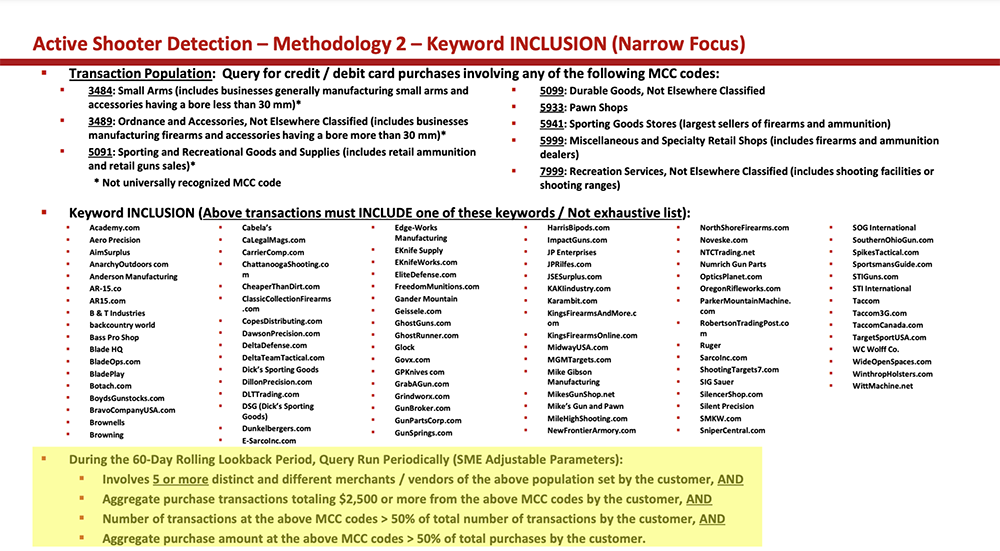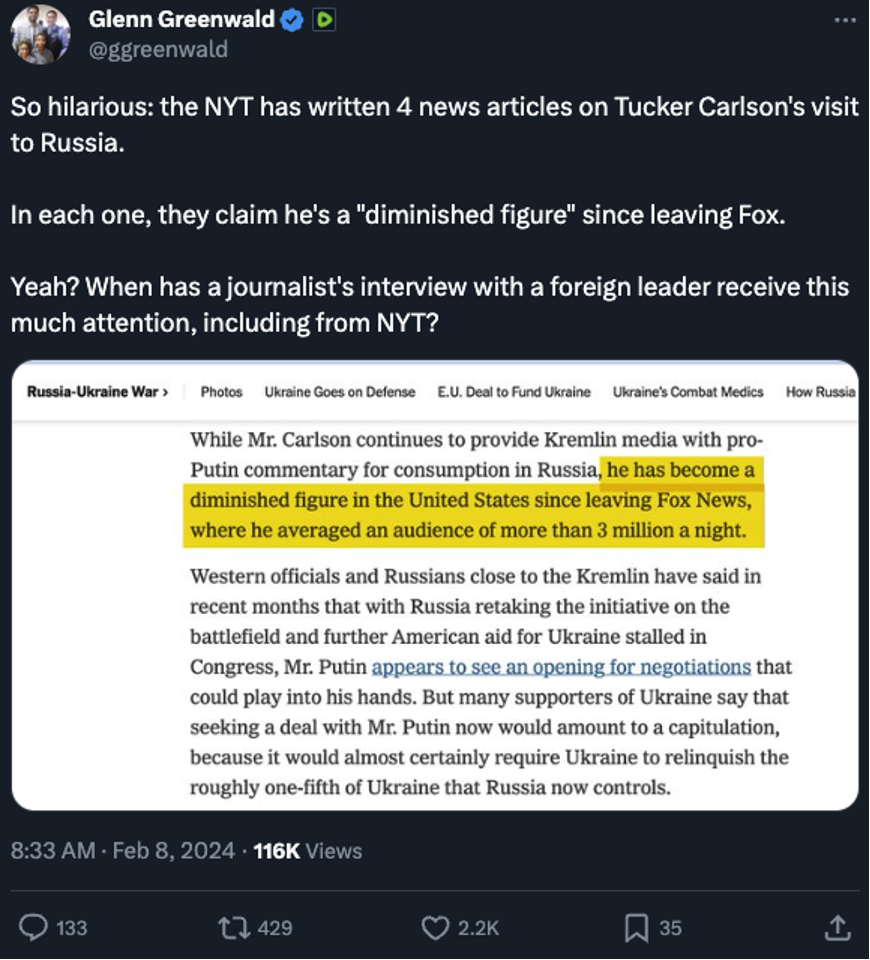Gun Owners’ Accounts Frozen
![]() The Political Credit Score
The Political Credit Score
 Sometimes the sheer horror of a story — its immense scope — doesn’t become evident until many months after the fact.
Sometimes the sheer horror of a story — its immense scope — doesn’t become evident until many months after the fact.
So it goes for our Bullet No. 1 today.
Here’s the tl;dr — American gun owners are in line for the Canadian trucker treatment, potentially in danger of having their bank and brokerage accounts frozen.
Sound too far-fetched? Even in light of everything else you know about the state of freedom in America these days?
As the saying goes, bold claims require bold proof. Read on…
 Our story begins about 18 months ago with an insidious proposal to change the credit card companies’ “merchant category code” for purchases of firearms and ammunition.
Our story begins about 18 months ago with an insidious proposal to change the credit card companies’ “merchant category code” for purchases of firearms and ammunition.
Everything you buy with a credit or debit card comes with an MCC. For a long time, purchases of guns and ammo fell under the broad category of sporting goods.
In September 2022, the international body that oversees MCCs proposed that guns and ammo get their own category. As we chronicled last year, this was done at the urging of gun-rights opponents including the union-owned Amalgamated Bank and the Giffords Law Center to Prevent Gun Violence.
Gun-rights supporters were alarmed: “Amalgamated Bank noted that they intend to create a software algorithm that will use the MCC ‘to report suspicious activity and illegal gun sales to authorities,’” said a web post by the NRA-ILA — the National Rifle Association’s Institute for Legislative Action.
As The New York Times went on to explain, “Banks could then either allow [the flagged] transactions, or block them and file suspicious activity reports with the Treasury Department’s Financial Crimes Enforcement Network, which would ideally also create a system to quickly forward that information to local law enforcement and the FBI.”
Among the many concerns gun-rights supporters had at the time: What exactly would constitute “suspicious activity” worthy of reporting to the feds?
OK, hold that thought…
 Fast-forward to last month — and a disturbing report from the House Judiciary Committee about the feds’ efforts in the realm of financial surveillance.
Fast-forward to last month — and a disturbing report from the House Judiciary Committee about the feds’ efforts in the realm of financial surveillance.
We chronicled this one too: The report revealed how FinCEN — the Financial Crimes Enforcement Network within the Treasury Department — was encouraging banks and other financial institutions to snitch on their customers to the feds, exercising an incredibly broad definition of “suspicious behavior” and “extremism.”
What got most of the headlines in conservative media were Zelle and Venmo transactions that customers labeled “Trump” or “MAGA” for one reason or another.
But transactions at Cabela’s and Bass Pro Shops were also fair game for the feds — presumably because that’s where firearms can be purchased.
 On further inspection, we now know exactly what the feds consider “suspicious behavior” and “extremism” in the realm of guns and ammo purchases — indeed, what might flag you as a “potential active shooter.”
On further inspection, we now know exactly what the feds consider “suspicious behavior” and “extremism” in the realm of guns and ammo purchases — indeed, what might flag you as a “potential active shooter.”

It shows up in a slide deck prepared by an unidentified financial institution and distributed by FinCEN to other financial institutions. You can click on the image to enlarge…
 “The highlighted portion shows how algorithmic analysis works in financial surveillance,” writes Matt Taibbi at his Substack site Racket News.
“The highlighted portion shows how algorithmic analysis works in financial surveillance,” writes Matt Taibbi at his Substack site Racket News.
“First compile a list of naughty behaviors, in the form of MCC codes for guns, sporting goods and pawn shops. Then, create rules: $2,500 worth of transactions in the forbidden codes, or a number showing that more than 50% of the customer’s transactions are the wrong kind, might trigger a response.
“The [House Judiciary] Committee wasn’t able to specify what the responses were in this instance, but from previous experience covering anti-money-laundering (AML) techniques at banks like HSBC, a good guess would be generation of something like Suspicious Activity Reports, which can lead to a customer being debanked.”
 Yes, the implications are terrifying: “Especially if enhanced by AI, a financial history can give almost any institution an immediate, unpleasantly accurate outline of anyone’s life, habits and secrets,” Taibbi goes on.
Yes, the implications are terrifying: “Especially if enhanced by AI, a financial history can give almost any institution an immediate, unpleasantly accurate outline of anyone’s life, habits and secrets,” Taibbi goes on.
“Worse, they can couple that picture with a powerful disciplinary lever, in the form of the threat of closed accounts or reduced access to payment services or credit.” Taibbi doesn’t exaggerate when he calls that one slide “a picture of the birth of the political credit score.”
Bottom line: “If banks and the Treasury are playing the same domestic spy game that Twitter and Facebook have been playing with the FBI,” Taibbi writes, “tales like the frozen finances of protesting Canadian truckers won’t be novelties for long.
“As is the case with speech, where huge populations have learned to internalize censorship rules almost overnight, we may soon have to learn the hard way that even though some behaviors aren’t illegal, they can still be punished with great effectiveness, in a Terminator-like world where computers won’t miss anything that moves.”
 The story is still unfolding — not least because of a developing red-state, blue-state divide.
The story is still unfolding — not least because of a developing red-state, blue-state divide.
If you take a closer look at the slide, you’ll notice that some of the MCCs are “not universally recognized.” That’s because the proposal to break out firearm purchases as its own MCC has not yet been adopted nationwide.
Several red states have enacted legislation curbing or even banning the use of a firearm-specific MCC. California, on the other hand, enacted a law last fall mandating its use for purchases from gun dealers.
But as you can also see from the slide, several other MCCs not specific to firearms can also ensnare you in the feds’ trap, including “sporting goods stores” in general and Cabela’s and Bass Pro Shops in particular. (Dick’s Sporting Goods too, even though Dick’s is phasing out its sales of guns and ammo!)
We’ll stay on top of the story. Even if you’re not a gun owner, you should care because there might be some activity of yours now or in the future that the feds will flag as “suspicious.”
It was never true, even in the immediate post-9/11 years, that “if you’ve got nothing to hide, you’ve got nothing to fear.” It sure as hell isn’t true now.
![]() Supply-Chain Snags, 2024 Style
Supply-Chain Snags, 2024 Style
 You heard it here first: Here comes the 2024 version of supply-chain snags.
You heard it here first: Here comes the 2024 version of supply-chain snags.
With Yemen’s Houthi faction continuing to harass U.S.- and Israeli-linked shipping, cargo that used to transit the Red Sea between Asia and the U.S. East Coast is now transiting the Pacific Ocean instead. And that could bring West Coast ports under pressure again, as they were during COVID lockdowns.
Retailers “have decided to bring cargo into the West Coast ports and then use intermodal rail to get the cargo back to the East Coast,” National Retail Federation Vice President Jonathan Gold told Congress last week.
So far, there’s no evidence of congestion at the ports of Los Angeles and Long Beach — but it’s something we’ll keep an eye on. We’ve been wary for weeks about the situation in the Red Sea bringing on shipping delays, rising costs… and a resurgence of inflation.
 As for the markets today, the S&P 500 continues to hover tantalizingly close to the 5,000 mark.
As for the markets today, the S&P 500 continues to hover tantalizingly close to the 5,000 mark.
At last check, the index is almost ruler-flat at 4,991. The Dow, meanwhile, is down about a quarter percent and the Nasdaq is up a quarter percent. Symmetry.
Not much excitement either direction in precious metals, either — gold at $2,029 and silver at $22.43.
Bitcoin has pushed back over $45,000 for the first time since the excitement over federal approval of Bitcoin ETFs a month ago.
![]() Foreign Follies
Foreign Follies
 The United States is now effectively at war with the Iraqi government installed by Washington in 2003–04 after the regime-change op that took out Saddam Hussein.
The United States is now effectively at war with the Iraqi government installed by Washington in 2003–04 after the regime-change op that took out Saddam Hussein.
Not that you see it reported that way in the mainstream, of course. There, the story is that a U.S. drone strike in Baghdad killed a senior commander of “an Iran-backed militia” that Washington holds responsible for the drone attack that killed three U.S. troops in Jordan last month.
The militia is called Kataib Hezbollah. What the mainstream doesn’t tell you is that this militia is fully incorporated into the structure of the Iraqi military.
“The U.S. is bombing and killing members of the Iraqi government’s armed forces,” tweets Daniel McAdams, who was the top foreign policy aide to former Rep. Ron Paul (R-Texas). “This is war. And Iraq will respond.”
Maybe a few smart cookies in the oil market recognize this reality: Crude is up over 2% and back above $75 for the first time in a week.
If you missed Jim Rickards’ case for higher oil prices during the rest of 2024, check out yesterday’s 5 Bullets.
 As if Washington isn’t committing America to enough wars already, U.S. Green Berets have been deployed to tiny islands just off the coast of mainland China.
As if Washington isn’t committing America to enough wars already, U.S. Green Berets have been deployed to tiny islands just off the coast of mainland China.
According to Taiwan’s TVBS outlet, American special forces are now stationed as “advisers” at Kinmen — islands controlled by Taiwan but lying as little as 6.2 miles from the Chinese city of Xiamen.

Asked for comment by antiwar.com, the Pentagon issued a classic non-denial denial: “We don’t have a comment on specific operations, engagements or training” with Taiwan, said an email from Pentagon spokesman Lt. Col. Marty Meiners.
“But I would highlight that our support for, and defense relationship with, Taiwan remains aligned against the current threat posed by the People’s Republic of China.”
As we highlighted last year, the Biden administration has all but junked the policy of “strategic ambiguity” that’s kept the peace in the Taiwan Strait for over 40 years. Washington is all but committed to intervene on behalf of Taiwan against China, just as it’s committed to act on behalf of Ukraine against Russia.
What’s old is new again: If you’re old enough, you might remember when Kinmen was known to Americans as Quemoy. The status of Washington’s commitment to defend Quemoy and nearby Matsu was a contentious issue during the Nixon-Kennedy election in 1960.
![]() An Election-Day Internet Shutdown
An Election-Day Internet Shutdown
 Scenario: An election in which millions of people have no confidence their voice will be heard, not least because a former leader sits in prison. Come Election Day, the authorities cut off wireless calls and data because of the threat of “terrorism.”
Scenario: An election in which millions of people have no confidence their voice will be heard, not least because a former leader sits in prison. Come Election Day, the authorities cut off wireless calls and data because of the threat of “terrorism.”
No, that’s not America on Nov. 5. It’s Pakistan today.
As the BBC reports…
The election comes almost two years after the previous prime minister, cricketer-turned-politician Imran Khan, was ousted in a no-confidence vote.
Three-time PM Nawaz Sharif was on the ballot in what many analysts say is Pakistan's least credible election yet.
Khan, jailed on corruption charges last year, is barred from standing and his party called the internet cut a "cowardly act."
About a year ago we did a deep dive into something that seems unthinkable to most Americans — internet shutdowns.
Even governments lauded as “democracies” resort to internet shutdowns — which have the effect of also shutting down online commerce. Pakistan’s next-door neighbor India leads the way. If you’re not acquainted with the tactic, you can (should) get up to speed here.
![]() The Pucker-Tutin Meltdown, Continued
The Pucker-Tutin Meltdown, Continued
 The liberal meltdown over Tucker Carlson’s interview with Russian President Vladimir Putin is a sight to see.
The liberal meltdown over Tucker Carlson’s interview with Russian President Vladimir Putin is a sight to see.
“Treason!” “Cancel his passport!” That’s what you see on social media. Go check it out for yourself if you don’t believe me.
Meanwhile in the corporate media…

And all of this over an interview that hasn’t even been released yet! (It’s scheduled to be posted on X-formerly-Twitter tonight at 6:00 p.m. EST.)

Yeah, seriously: Unless and until Washington drops its Espionage Act case against Wikileaks founder Julian Assange, no American has the prerogative to cast stones overseas when it comes to press freedom. (Assange’s last shot at preventing extradition to the United States comes in less than two weeks.)
We give the last word today to Clint Russell, host of the Liberty Lockdown podcast: “The systems of control are failing,” he tweets. “If a single interview is enough to unwind years of propaganda they are in major trouble.
“Press harder than you ever have before.”
Best regards,

Dave Gonigam
Managing editor, Paradigm Pressroom's 5 Bullets










